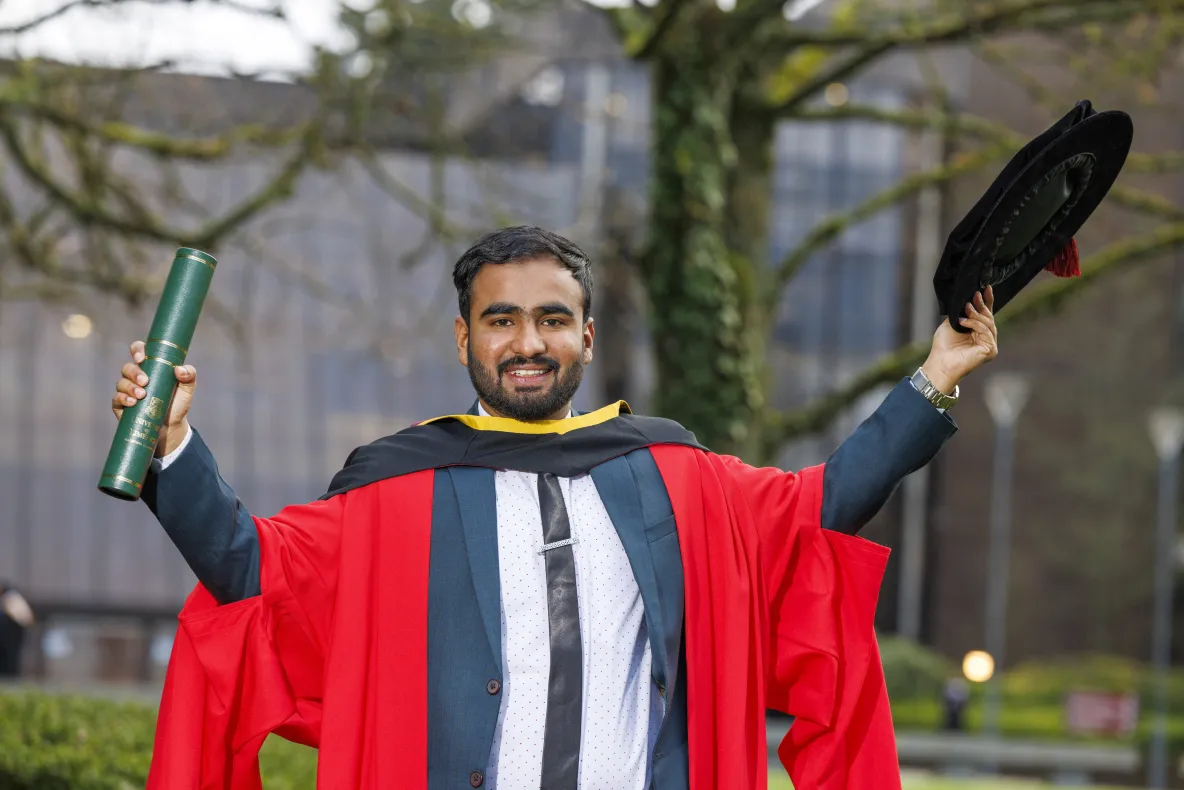
Inspired by his community’s energy crisis, a University of Limerick graduate has become the pride of his hometown in Pakistan as he becomes the first person from the community to earn a PhD.
Muhammad Muddasar, originally from a small rural village in the Jhang District in Pakistan, is one of 1,705 new graduates being conferred at UL this week.
He graduated with a Doctorate in Sustainable Materials from UL’s Faculty of Science and Engineering and has made history as he becomes the first ever person from his village to earn a doctorate.
Growing up, Muhammad’s daily family life was disrupted by regular power shortages. Motivated by his circumstances, he vowed to find solutions to energy problems from an early age.
Muhammad has since dedicated his academic career to date to advancing the field of sustainable energy and is now on a mission to utilise waste heat as a sustainable energy source.
“When I was 12 years old, there were regular power outages which lasted most of the day. It was insane, some days we would only have three hours of light in the whole day,” Muhammad recalled.
“When there was a power shortage, we had to find other ways to do things, for water we used hand pumps, for cooking we used natural gas but when there’s no way to use electricity, you can't meet the needs of a family in three hours.
“The constant need for petrol to run generators was not only costly but also unsustainable. The need for sustainable and affordable energy solutions became clear to me,” he added.
Muhammad witnessed firsthand how members of his community were forced to create alternative energy solutions. Using the anaerobic digestion process, local farmers used wells to convert manure into gas, which they used to power up their generators.
Inspired by the innovation he observed and driven by a curiosity to explore better energy solutions, in 2014 Muhammad applied to university. He became the first person in his family to go to university when he accepted a place in the BSc in Mechanical Engineering at the University of Lahore later that year.
Committed to supporting his son’s studies and keeping the close-knit family together, his father relocated the whole family to Lahore to support him shortly afterwards.
“My role model was my father, he taught me to work hard, keep learning, and make a positive difference,” Muhammad reflected.
An exceptional student, Muhammad graduated at the top of his class. He worked in industry before completing a fully funded MSc in Energy Systems Engineering in 2021 and subsequently applying for his PhD at UL.
Attracted to Ireland due to its strong focus on sustainability and energy research, paired with the opportunity to study under leading experts in sustainability, he found a new home at UL’s Bernal Institute in 2021.
Muhammad's research project which is titled, 'Energy production and storage devices via ionic thermoelectric membranes and carbon-based materials derived from lignocellulose waste’, is related to the Irish bioeconomy and is funded by the Department of Agriculture, Food and the Marine.
Offering congratulations to Muhammad, Professor Maurice Collins, Professor of Materials Science in UL’s School of Engineering, said it was a pleasure to supervise him.
“He showed tremendous dedication, talent, and ingenuity in every aspect of thesis work. Whilst distinguishing himself with multiple accolades throughout the journey, I am certain a very bright future lies ahead for Muhammad,” Professor Collins said.
During his time at UL, Muhammad won UL’s 3-Minute Thesis competition during Research Week 2024 and also took the Editor's Choice Award at the UK and Ireland Vitae 3MT Competition Final for his presentation on his research titled, 'Harnessing the Power of Leftover Lignin for Waste Heat Harvesting'.
Reflecting on the challenges still faced by rural communities in Pakistan, Muhammad is hopeful for a brighter future for his family there.
“The most important sector of renewable energy in Pakistan is solar, and these days it's popular in my village, now every house has one or two solar plates.”
In the past, the energy crisis in Pakistan created a barrier to accessing education for many young people. With his nieces and nephews going to school in Lahore, Muhammad can now see the impact of new government initiatives in renewable energy making real changes for people there.
“The government in Pakistan started an initiative in recent years of giving one solar plate with two LED bulbs and a battery to students in school. So now students can read or write at night, even without electricity. So that's a really good initiative,” he said.
When asked about his career aspirations, Muhammad explained that he has applied for Irish Research Council funding to take his research to commercialisation stage and plans to continue building his academic career at UL.
“My hopes for the future are to contribute to the development of sustainable energy solutions particularly for wearable tech. I plan to continue my research and work in the field of sustainability, aiming to make a positive impact on both local and global energy challenges,” he added.